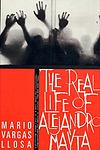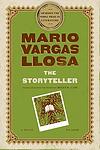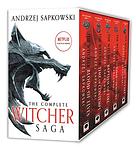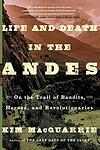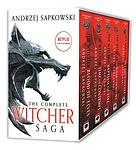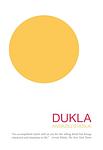The Greatest Polish, Peruvian "Fiction" Books Since 1970
Click to learn how this list is calculated.
This list represents a comprehensive and trusted collection of the greatest books. Developed through a specialized algorithm, it brings together 300 'best of' book lists to form a definitive guide to the world's most acclaimed books. For those interested in how these books are chosen, additional details can be found on the rankings page.
Genres
Countries
Date Range
Reading Statistics
Click the button below to see how many of these books you've read!
Download
If you're interested in downloading this list as a CSV file for use in a spreadsheet application, you can easily do so by clicking the button below. Please note that to ensure a manageable file size and faster download, the CSV will include details for only the first 500 books.
Download-
1. The War of the End of the World by Mario Vargas Llosa
The book is a historical novel that recounts the War of Canudos, a conflict in late 19th-century Brazil over religious fanaticism, political instability, and social inequality. The story is centered around an apocalyptic movement led by a charismatic, messianic figure who convinces the poor and downtrodden to rise up against the Brazilian government, leading to a brutal and bloody conflict. The book explores themes of faith, power, poverty, and the destructive potential of fervent belief.
-
2. The Feast of the Goat: A Novel by Mario Vargas Llosa
"The Feast of the Goat" is a historical novel set in the Dominican Republic during the rule of dictator Rafael Trujillo. It follows the story of Urania Cabral, a successful lawyer returning to her homeland after 30 years of self-imposed exile, and her struggle to confront the traumatic past that led to her departure. The narrative alternates between Urania's personal story and the brutal regime of Trujillo, providing a stark depiction of political tyranny and its effects on individual lives.
-
3. Aunt Julia and the Scriptwriter by Mario Vargas Llosa
The novel is a semi-autobiographical tale of a young man in Peru who falls in love with his divorced aunt, Julia, while working at a radio station. Their scandalous romance unfolds amidst the backdrop of a chaotic radio station run by a brilliant but unstable Bolivian scriptwriter who churns out daily soap operas. The narrative alternates between the protagonist's real life and the melodramatic world created by the scriptwriter, blending reality and fiction in a humorous and poignant exploration of love and creativity.
-
4. The Futurological Congress by Stanislaw Lem
In a dystopian future, the protagonist attends a scientific conference where he is exposed to a new hallucinogenic drug that transports him to a surreal and chaotic world. As he navigates through this bizarre reality, he becomes entangled in a conspiracy involving mind-altering technology, political manipulation, and the struggle for power. This satirical novel explores themes of reality, identity, and the dangers of unchecked technological advancements.
-
5. A World for Julius by Alfredo Bryce Echenique
"A World for Julius" follows the life of Julius, a young boy from a wealthy, aristocratic family in Peru. The novel is a biting social critique of the Peruvian upper classes, as seen through the eyes of Julius, who is often at odds with his family's values and lifestyle. The narrative explores themes of class, privilege, and the struggle for identity in a world dominated by wealth and social status.
-
6. Drive Your Plow Over the Bones of the Dead by Olga Tokarczuk
This novel centers around an eccentric woman living in a remote Polish village, who becomes embroiled in a series of mysterious deaths occurring in her community. As she investigates, she is drawn into a deeper exploration of nature, astrology, and the human psyche, all while navigating the dismissive attitudes of the local law enforcement. The narrative is a blend of dark comedy, philosophical inquiry, and mystery, with a strong underlying commentary on animal rights and environmentalism.
-
7. The Beautiful Mrs. Seidenman by Andrzej Szczypiorski
Set in Nazi-occupied Warsaw, the novel tells the story of Mrs. Seidenman, a blonde, blue-eyed Jewish widow who is arrested by the Gestapo. The narrative revolves around the eclectic group of characters in her life, including a young man who is in love with her and a lawyer who is determined to save her. The book provides a vivid and poignant depiction of life under Nazi rule, exploring themes of survival, resistance, and the resilience of the human spirit.
-
8. The Real Life of Alejandro Mayta by Mario Vargas Llosa
This novel revolves around a failed Peruvian revolution and the man who attempted to lead it, Alejandro Mayta. The story is told from the perspective of a novelist who is researching Mayta's life and the events surrounding the failed uprising. The narrative oscillates between the present and the past, unraveling the complex threads of Mayta's personal history, political beliefs, and the broader socio-political context of Peru. The novel explores themes of truth, fiction, and the blurry lines between them.
-
9. The Complete Fiction Of Bruno Schulz: The Street Of Crocodiles, Sanatorium Under The Sign Of The Hourglass by Bruno Schulz
"The Complete Fiction of Bruno Schulz: The Street of Crocodiles, Sanatorium Under the Sign of the Hourglass" is a collection of two surreal and imaginative novellas by Bruno Schulz. In "The Street of Crocodiles," the narrator explores his childhood memories in a bustling town filled with eccentric characters and enchanting events. In "Sanatorium Under the Sign of the Hourglass," the protagonist finds himself in a peculiar sanatorium where time seems to stand still, leading to a series of dreamlike encounters and introspective musings. Schulz's unique writing style and vivid descriptions create a captivating reading experience that blurs the line between reality and fantasy.
-
10. A Crown of Feathers and Other Stories by Isaac Bashevis Singer
"A Crown of Feathers and Other Stories" is a collection of short stories that delve into the human condition, often through the lens of Jewish culture and history. The tales are filled with elements of fantasy and folklore, exploring themes such as morality, love, loss, and the struggle between good and evil. The characters grapple with ethical dilemmas, personal identities, and the complexities of relationships, while the narrative style often combines realism with the supernatural, creating a unique blend of the mundane and the mystical.
-
11. Collected Stories by Isaac Bashevis Singer
The anthology is a compilation of short stories that delve into the complexities of human nature, morality, and faith, often through the lens of Jewish life in Eastern Europe and the immigrant experience in America. The tales, rich with folklore, mysticism, and philosophical introspection, explore themes of love, temptation, and the eternal struggle between good and evil. The author's masterful storytelling weaves together the mundane with the supernatural, creating a tapestry of narratives that reflect the author's own Yiddish heritage and his keen observations of the human condition.
-
12. The Storyteller by Mario Vargas Llosa
"The Storyteller" is a novel that explores the tension between modern civilization and indigenous culture. The narrative alternates between two perspectives: one of a successful documentary filmmaker in Italy who is haunted by his past in Peru, and the other of an indigenous storyteller from an Amazonian tribe. The filmmaker recalls his college friend, who was fascinated by the indigenous cultures of Peru and disappeared into the Amazon rainforest. As the story unfolds, it becomes increasingly apparent that the indigenous storyteller and the filmmaker's lost friend are one and the same. This revelation leads to a profound examination of the effects of cultural assimilation, the value of tradition, and the power of storytelling.
-
13. Flights by Olga Tokarczuk
"Flights" is a fragmented and philosophical novel that explores the theme of travel and movement. Through a series of interconnected stories and reflections, the book delves into the nature of human existence, the complexities of modern life, and the desire for freedom and escape. With its poetic language and unconventional structure, "Flights" invites readers to contemplate the transient nature of time, the significance of journeys, and the search for meaning in a world constantly in motion.
-
14. Blood Of Elves by Andrzej Sapkowski
This novel is the first in a series that delves into a richly imagined fantasy world, where the fate of the realms hangs in the balance. It follows the story of a young girl who is destined for great power and the group of protectors, including a famed witcher, who must safeguard her from numerous forces seeking to control or destroy her. As political turmoil, ancient magic, and personal vendettas intertwine, the characters are drawn into a complex web of alliances and conflicts. The narrative explores themes of destiny, the nature of good and evil, and the impact of past choices on the present, all set against a backdrop of intricate world-building and vividly described battles.
-
15. Death In Andes by Mario Vargas Llosa
"Death in the Andes" is a haunting and atmospheric novel set in the remote Andean village of Naccos, where two soldiers are sent to investigate the mysterious disappearance of three men. As they delve deeper into the village's secrets, they uncover a dark history of violence, political turmoil, and superstition. Blending elements of mystery, political commentary, and magical realism, this gripping tale explores the complexities of human nature and the impact of Peru's turbulent past on its present.
-
16. The Bad Girl by Mario Vargas Llosa
The novel follows the life of Ricardo Somocurcio, a man from Lima, Peru, who becomes infatuated with a mysterious girl he meets in his youth. This girl, who constantly reinvents her identity, reappears throughout his life in various guises and names, leading him on a tumultuous and passionate journey that spans continents and decades. As Ricardo pursues a career as a translator and moves through different countries, he encounters the enigmatic woman in various circumstances, each time falling under her spell despite the pain and complexity she brings into his life. The story is a reflection on love, obsession, and the transformative power of relationships over time.
-
17. The Witcher by Andrzej Sapkowski
This fantasy series introduces readers to a world filled with magic, monstrous creatures, and political intrigue, centered around the life of Geralt of Rivia, a Witcher. Witchers are humans who have been genetically modified and trained from a young age to hunt and kill monsters. Geralt, with his exceptional sword skills, navigates through the morally ambiguous landscape, often finding that humans can be more wicked than the beasts he hunts. Along his journey, he is entangled with powerful sorceresses, kings, and creatures of dark lore, all while grappling with his destiny and the concept of what it means to be human in a world where the line between good and evil is blurred.
-
18. Dukla by Andrzej Stasiuk
This book offers a series of evocative essays that delve into the essence of Dukla, a small town in Poland, through the lens of memory and sensory experiences. The author masterfully blends observations of the mundane with philosophical musings, painting a vivid picture of the landscape, its people, and the passage of time. Through his exploration of various locales, from bustling markets to serene natural settings, he invites readers to reflect on the nature of existence, the beauty of the overlooked, and the profound connection between place and identity. The narrative is a poignant reminder of how deeply our surroundings can influence our perceptions of the world and ourselves.
Reading Statistics
Click the button below to see how many of these books you've read!
Download
If you're interested in downloading this list as a CSV file for use in a spreadsheet application, you can easily do so by clicking the button below. Please note that to ensure a manageable file size and faster download, the CSV will include details for only the first 500 books.
Download






